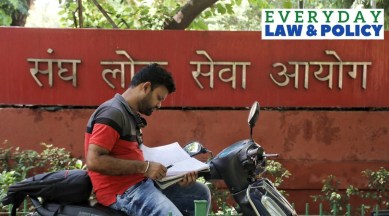UPSC Civil Services Exam result out: How the Union Public Service Commission was set up
The UPSC has its genesis in the Civil Service Commission set up by the British government in 1854.

The Union Public Service Commission (UPSC) released the Civil Services 2022 exam results on Tuesday (May 23). The civil services are among the most prestigious exams in the country, with around 10 lakh taking them each year to qualify for the Indian Administrative Service, Indian Police Service, Indian Foreign Service, among others.
Here is how the Union Public Service Commission was set up.
monthly limit of free stories.
with an Express account.
History
The UPSC has its genesis in the Civil Service Commission set up by the British government in 1854. Prior to this, civil servants for India were nominated by the East India Company, and then trained at Haileybury College in London.
However, following a report by Lord Thomas Macaulay, it was decided that instead of nominations, civil servants should be selected through a competitive exam. Thus, the Civil Service Commission was set up, and for some years, exams were held only in London. It was a decade later, in 1864, that Satyendranath Tagore (brother of Rabindranath Tagore) became the first Indian to clear the exam. The exam started being held in India only from 1922, after the First World War.
In independent India
According to the UPSC website, the “origin of the Public Service Commission in India is found in the First Dispatch of the Government of India on the Indian Constitutional Reforms on the 5th March, 1919 which referred to the need for setting up some permanent office charged with the regulation of service matters.
This concept of a body intended to be charged primarily with the regulation of service matters, found a somewhat more practical shape in the Government of India Act, 1919. Section 96(C) of the Act provided for the establishment in India of a Public Service Commission which should “discharge, in regard to recruitment and control of the Public Services in India, such functions as may be assigned thereto by rules made by the Secretary of State in Council”.
On October 1, 1926, the Public Service Commission was set up in India.
“The functions of the Public Service Commission were not laid down in theGovernment of India Act, 1919, but were regulated by the Public Service Commission (Functions) Rules, 1926 framed under sub-section (2) of Section 96(C) of the Government of India Act, 1919. Further, the Government of India Act, 1935 envisaged a Public Service Commission for the Federation and a Provincial Public Service Commission for each Province or group of Provinces. Therefore, in terms of the provisions of the Government of India Act, 1935 and with its coming into effect on 1st April, 1937, the Public Service Commission became the Federal Public Service Commission,” the website says.
After independent India adopted its Constitution on January 26, 1950, the Federal Public Service Commission became the Union Public Service Commission, under Clause (1) of Article 378 of the Constitution.
Role, finances
All expenses for the UPSC are paid from the Consolidated Fund of India. Its functions, according to the website, include, “Conduct examinations for appointment to the services of the Union; Direct recruitment by selection through interviews; Appointment of officers on promotion / deputation / absorption; Framing and amendment of Recruitment Rules for various services and posts under the Government; Disciplinary cases relating to different Civil Services; Advising the Government on any matter referred to the Commission by the President of India.”